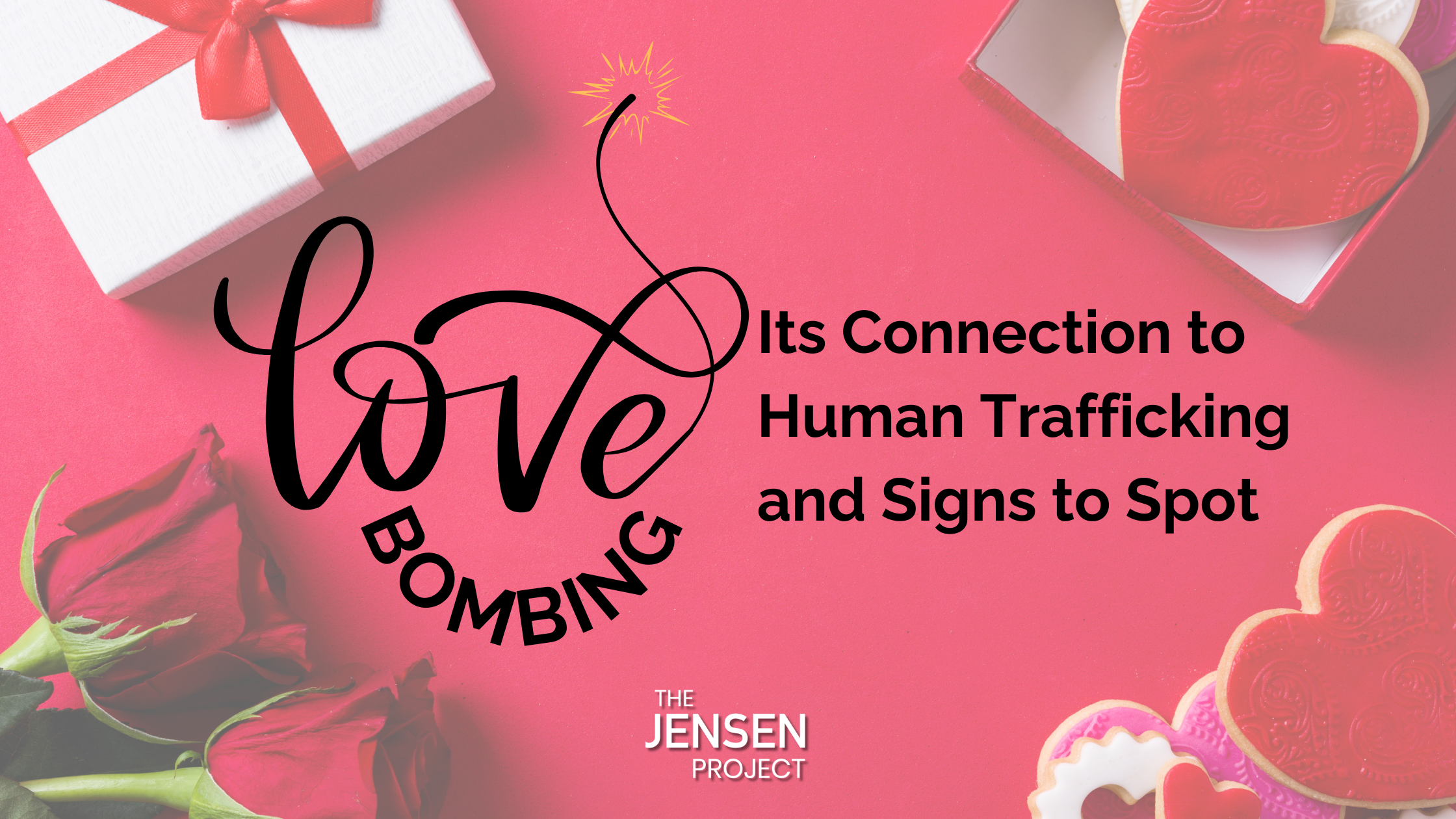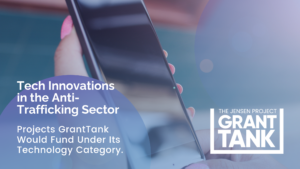Love bombing and grooming go hand-in-hand. They are the coercive tactics of abusers and traffickers to earn the trust of someone who is starving for validation. Before victims are commercially exploited, their craving for love is often exploited first.
In this article, we’ll cover the difference between love bombing and grooming, the connection between human trafficking and domestic violence, and how love bombing is relevant to Teen Dating Violence Awareness Month. Then, we’ll distinguish red flags from abuse and note five signs of love bombing.
What Is the Difference between Love Bombing and Grooming?
In the cycle of abuse, love bombing is stage zero. It is the foundation before the tension builds to abuse, ensuring that the victim feels emotionally dependent on the perpetrator for self-esteem and self-worth. Once the perpetrator knows that the victim is hooked (deliberate word choice, as one can become addicted to the extreme oscillation between love bombing and abuse), they will gradually become more distant until the first instance of abuse. The cycle returns to love bombing (often called “reconciliation” in most charts of the abuse cycle) to keep the victim in the relationship. But each time the cycle returns to this stage, the “love” will feel weaker than it did in the start of the relationship, so that the victim is constantly chasing the high they felt in the beginning. Each time the cycle repeats, the abuse is likely to become more and more violent and even life-threatening.
In the stages of human trafficking, grooming is stage 0.5, after identifying a vulnerable person as a potential victim. Typically, grooming is used when the perpetrator has societal power over the victim, oftentimes an age difference. The older perpetrator will groom their victim using many of the same tactics as love bombing, which we’ll detail below. After grooming, the perpetrator will recruit the victim into the sex trade, making them believe—using force, fraud, or coercion—that it is their idea or they have to support their families, so they have to sell sex. The perpetrator often avoids legal accountability for their crimes, as the victims are usually arrested for prostitution, and they often actively ruin the victim’s credit to keep them trapped in The Life, or the sex trade.
The Connection between Human Trafficking and Domestic Violence
The second most common entry point into sex trafficking is an intimate partner. A “Romeo pimp” will make the victim believe they are in a romantic relationship, but the original intention of the perpetrator is to profit off of the victim’s commercial sexual services. It is common for a victim to believe their trafficker is an abusive partner, and they may seek refuge at domestic violence shelters as a result. However, the complex sexual trauma of trafficking victims requires different exit services than domestic violence victims. A domestic violence shelter may be a good place to start, but eventually, best results will come from entering housing and a program through an agency that specializes in anti-trafficking.
What Does Love Bombing Have to Do with Teen Dating Violence Awareness Month?
Teens are especially susceptible to abuse and trafficking. One out of twelve teen girls say that they have been physically harmed by their partner, but the research does not indicate how old their partners were. Oftentimes, young girls will enter into relationships with much older men, not recognizing the power imbalance between them. Additionally, the average age of entry into The Life is 12.
It’s important to talk to children and teens the moment they express interest in dating, so they can understand the difference between healthy, unhealthy, and abusive behaviors in relationships. If they are not aware that they do not have to put up with certain damaging behaviors from their “partner,” they may tolerate abuse to the point of great harm or exploitation. When they know what love looks like, they are more equipped to find it.
Red Flag or Abuse?
Because love bombing and grooming are part of the cycle of abuse and stages of trafficking, The Jensen Project recognizes these patterns as abusive and harmful in and of themselves. In other words, love bombing is not a “red flag” of abuse. It is abuse. Likewise, even if initiation is interrupted after the grooming stage of trafficking, the grooming itself is enough to traumatize a victim. In that case, they would have avoided repeat, complex sexual trauma, which would have had lasting cognitive effects, but trauma is not linear. Grooming is also not a “red flag” but a harmful act on its own.
5 Signs of Love Bombing
1. Expensive Gifts
When a prospective partner or older online “friend” gives expensive, lavish gifts, this is a sign of love bombing or grooming. There is a difference between receiving a token that says, “I thought of you” and being given a gift that one could not afford on their own, especially after only knowing each other for a short amount of time. Consider: what does the perpetrator have to gain from sending a Nintendo Switch, expensive jewelry, or paying for clothes, nail or hair appointments, and even rent?
2. Constant Connection
In the love bombing stage of the cycle of abuse, constant connection is key to creating the chemical dependency on the perpetrator. When the victim does separate from the perpetrator (to go to school or work or to fulfill other responsibilities), it can become painful. Conversely, it can feel good for a victim to know that someone wants to spend time with them all the time. However, healthy people with healthy boundaries have lives outside of their relationship and will want to spend time upholding their own responsibilities.
3. Unwarranted Affection
At the beginning of a relationship or “friendship,” interest is present but not trust or love. Those take time and effort to build. However, in love bombing and grooming, the perpetrator will shower the victim in unwarranted affection: “I love you” when partners do not know each other well is an empty statement used to make the victim feel connected and dependent on the perpetrator. They may even act as if they have a special psychic connection with the victim, offering boilerplate compliments, or ones that could be used to describe someone else (i.e., “You’ll be such a good mom one day. I can just tell that about you”).
4. “No” Means “Yes”
Perhaps the strongest indicator that the perpetrator does not truly care for the victim is that they do not respect when the victim says, “No.” A victim may say, “I can’t talk tonight. I have to study for a test,” and the perpetrator may show up at their home with gifts or dinner, making the victim feel obligated to spend time with them and neglect their responsibilities. A victim may decline to be physically affectionate or sexually active, but the perpetrator may say, “But you’re so beautiful. I can’t keep my hands off you.” Boundaries are important and will be respected by someone who cares.
5. Bad Mouthing Good People
Perpetrators of abuse and exploitation will be suspicious of or defensive around the victim’s close friends or family. When a victim shares a story about a friend or family member, the perpetrator may jump to defend them, often using inflammatory language to put friends or family members down. This could be an early effort to divide the victim from their support system. A healthy person will validate their partner’s feelings in a situation without putting down the people who are closest to them. It is important to note, however, that victims may be trying to flee abusive or toxic environments, meaning that the perpetrator may rightfully criticize the actions of family or friends, but not for the right reasons. In this case, one can tell this love bombing tactic by also considering the perpetrator’s surrounding actions. If the perpetrator cares more about the role the victim plays for them than they care about the victim as an individual, this is a bad sign.
Are You Being Love Bombed or Groomed?
If you believe you are being love bombed or abused in a romantic relationship, call the National Domestic Violence Hotline at 800-799-7233.
If you believed you are being groomed to be sexually exploited, call the National Human Trafficking Hotline at 888-373-7888.
Share this post, so others can learn about love bombing and grooming. Let’s help teens avoid the heartache of abuse, or worse.






